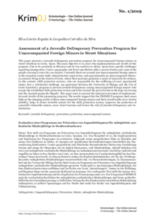This paper presents a juvenile delinquency prevention program for unaccompanied foreign minors in street situations in Ceuta, Spain. The main objective is to assess the implementation and results of this program. Due to its proximity to Morocco and its two enclaves in Africa, Spain faces specific challenges regarding immigration. Ceuta’s geographic and fiscal specificities offer a porous border and some of the people crossing it every day are minors. Currently there are around 300 unaccompanied foreign minors in the reception centre under administrative supervision, and approximately 50 unaccompanied Moroccan minors living in the streets of Ceuta, where their presence generates a sense of insecurity for citizens. In this context, child protective services, who are responsible for the wellbeing of every unprotected minor, face a substantial challenge. An agreement between the University of Malaga and the City of Ceuta launched a program to prevent juvenile delinquency among unaccompanied foreign minors who escape the established child protection system and loiter around the port of Ceuta in the hope of crossing into the Spanish peninsula illegally. This paper aims to present the internal assessment of implementation and results of this pioneering program. The results suggest that the PREMECE program sheds more light on the changing reality of these unaccompanied foreign minors and their considerable cross-border mobility, helps to detect invisible minors for the child protection system, improves the protection of especially vulnerable minors, eases street tensions and lowers the risk of juvenile delinquency and victimization.

